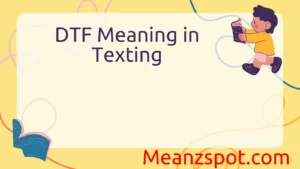Online conversations move fast, and abbreviations like JFC pop up all the time. But what does it mean? In modern slang, JFC stands for “Jesus F*ing Christ”**. It’s not usually meant in a religious sense—it’s more of a strong reaction to surprise, frustration, or even excitement. You’ll often see JFC in memes, casual chats, and social media posts where people want to add dramatic emphasis without typing out a full sentence.
Depending on the tone, it can come across as funny, annoyed, or just plain expressive. Understanding JFC in chat helps you follow conversations more smoothly and catch the emotions behind the words.
Definitions & Meaning
JFC is an acronym that stands for “Jesus F*ing Christ.”** It’s used primarily as an exclamation to express strong emotions like frustration, surprise, shock, or disbelief. The term is considered informal and often carries a tone of intensity or emphasis.
For example, if someone says:
- “JFC, I can’t believe how long this line is!”
they’re expressing annoyance or frustration at the wait.
Because it contains profanity and a religious reference, JFC is usually used in casual or informal settings rather than professional or polite conversation. The acronym lets people quickly convey strong feelings without typing out the full phrase.
In some cases, people use it humorously or sarcastically, depending on the tone and context. It’s important to recognize that, due to the religious aspect, some might find the term offensive, so it’s best used with caution.
Origins & History
The phrase “Jesus Christ” has long been used as an exclamation in English, often to express surprise or shock. Over time, as language evolved and became more casual, people started adding stronger emphasis to these expressions by inserting swear words like “f***ing” for extra impact.
The abbreviation JFC likely emerged with the rise of online chatrooms, text messaging, and internet forums in the late 1990s and early 2000s, when brevity became essential. Instead of typing the entire phrase, users shortened it to JFC to save time and space while maintaining the expression’s intensity.
It became popular in various internet subcultures and eventually spilled over into mainstream texting and social media use. While the full phrase has a much longer history rooted in English-speaking cultures, the acronym form is very much a product of digital communication’s need for speed and shorthand.
Usage in Different Contexts
Social Media and Texting
On platforms like Twitter, Instagram, or in group chats, JFC is often used to react quickly to surprising or frustrating news. For example, a user might tweet:
- “JFC, I just missed my bus by one minute!”
to show irritation.
It’s common in informal conversations among friends but less appropriate in professional or formal settings.
Professional or Formal Use
In business emails or official communication, JFC is rarely, if ever, used. Its informal and profane nature makes it unsuitable for workplace conversations. Professionals tend to avoid acronyms involving swearing to maintain decorum and respect.
Pop Culture
Occasionally, JFC shows up in TV shows, movies, or online memes to capture realistic dialogue or emphasize a character’s emotional response. Pop culture helps spread acronyms like this, making them recognizable even outside internet-savvy groups.
Common Misunderstandings & Clarifications
Because JFC is an acronym, people sometimes misinterpret it or confuse it with other phrases. Some common mix-ups include:
- Thinking it stands for something innocent or unrelated (e.g., “Just For Conversation” or “Joyful Friendly Chat”). These are incorrect and not widely accepted meanings.
- Misunderstanding the level of profanity involved. JFC contains a swear word, so it’s stronger than many other acronyms like LOL or OMG.
- Using it in inappropriate settings, which can offend others, especially if they are sensitive to religious references or swearing.
It’s important to know your audience before using JFC to avoid awkward or offensive situations.
Alternatives & Synonyms
If you want to express frustration or surprise without using JFC, here are some cleaner alternatives:
- OMG (Oh My God) – A very common and milder exclamation.
- WTF (What The F***) – Similar in intensity but without religious references.
- FML (F*** My Life) – Used to express frustration or bad luck.
- Crap! or Dang! – Politer, less intense expressions.
- Sheesh! – A milder way to express disbelief or annoyance.
Choosing an alternative depends on how strong you want the reaction to be and your audience’s comfort level with profanity.
Frequently Asked Questions (FAQ)
1. Is JFC offensive?
Yes, it can be offensive to some people due to the profanity and religious nature. Use it carefully and only in informal contexts with people who won’t be offended.
2. Can I use JFC at work?
It’s best to avoid using JFC in professional or formal settings because it is considered unprofessional and potentially offensive.
3. What does JFC stand for besides “Jesus F*ing Christ”?**
There are no widely recognized alternatives for JFC. Most uses refer to the phrase with the religious swear word.
4. How is JFC pronounced?
People usually say the full phrase (“Jesus F***ing Christ”) aloud, but online it’s mostly read as the acronym itself, “J-F-C.”
5. Is JFC commonly used in all English-speaking countries?
It’s primarily popular in English-speaking countries but might be more common among younger internet users and less so in formal or traditional settings.
6. Are there any situations where JFC is appropriate?
Yes, casual conversations among friends, online forums, or social media where informal and expressive language is common.
7. How should I respond if someone uses JFC?
It depends on the tone and your relationship with the person. You can empathize, joke back, or simply acknowledge their frustration.
Conclusion
Understanding what JFC means and how to use it correctly can help you navigate online conversations with ease. It’s an acronym for “Jesus F***ing Christ,” used to express strong emotions like shock, frustration, or disbelief. Though common in casual digital communication, it’s important to be aware of its informal and potentially offensive nature. The acronym has roots in both religious exclamations and the need for quick texting shorthand, and its use varies depending on the social context.
If you want to avoid offending anyone, consider using milder alternatives like OMG or WTF. Knowing when and where to use JFC will keep your messages clear and appropriate — making your digital interactions smoother and more enjoyable.



